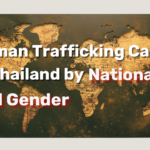
By Opas Boonlom for the Nation on 24 August 2015,
THE CRIMINAL Court's three new divisions, covering human trafficking, narcotics, and corruption and misconduct of state officials, were established to boost the effectiveness and speed of prosecutions, the court's deputy-chief judge Pongsak Tragoolsilpa said.
"Having more effective justice |procedures in place will allow Thailand to better respond to foreign countries' doubts or questions while also boosting confidence in the justice system. The fast and timely prosecution process would also make people think twice before committing such crimes, thereby helping in crime prevention," Pongsak said.
The new divisions were established by the Office of the Judicial Administration Commission (OJAC).
The division covering the corruption and misconduct of state officials would have four judicial panels, each with two judges. It would focus on graft by public and state enterprise officials not those in which the accused were members of parliament, senators or ministers and corruption cases from the National Anti-Corruption Commission (NACC) and the Public Sector Anti-Corruption Commission (PACC).
The NACC cases would apply the inquisitorial system to trial processes, which would allow the court to play a bigger role in interviewing witnesses and finding facts. However, the cases from the PACC and those in which state officials are accused of corruption would still use the current criminal cases' method with public prosecutors.
The division covering narcotics would have eight judicial panels, each with two judges. It would tackle major drug trafficking cases but would not take up drug abuse cases. Such drug cases would be conducted within two levels the primary court and the appeals court hence, trials in the lower court would have to be conducted carefully and with complete facts, Pongsak said.
The division covering human trafficking would have six judicial panels, each with two judges. It would concentrate on cases that exploit human beings, such as prostitution, forced labour, forced begging, slavery and the illegal trade of human organs.
The Supreme Court's policy states that the primary court must get testimonies and deliver rulings on human trafficking cases within six months. The key to the success of human trafficking cases was to keep track of witnesses.
Since most victims were poor people who might not have permanent residences or foreigners who have to return to their home country shortly after the crime, the prosecution must conduct advance interviews of witnesses before indictment. Video conference technology can also be used in witness testimony hearings so that frightened victims and witnesses don't have to confront the defendants. During such assisted sessions, witnesses would testify in different rooms to the defendants.
On August 10, during the opening ceremony at Bangkok's Ratchadaphisek Criminal Court, a memorandum of understanding on sharing information on human trafficking cases was signed by five agencies: the Criminal Court, the Office of the Attorney General, the Royal Thai Police, the Justice Ministry and the Social Development and Human Security Ministry.
The memorandum focuses on two key points: co-ordination among the prosecution and witness protection.
For prosecution co-ordination, a centre for human-trafficking cases would be set up at each agency to co-ordinate the cases and tackle obstacles. The protection aspect would focus on the rehabilitation and protection of witnesses, victims and their families.
"After Thailand was kept on Tier 3, lowest level, of the United States' 'Trafficking in Persons' report, the government elevated human trafficking as a national agenda; thus, all parts in the country must move along and see the importance of the issue," Pongsak said.
The Criminal Court currently handles 40 human trafficking cases, 50 corruption cases and about 8,000 drug cases per year.
'Judges who know the issues'
"The three types of cases should be handled by judges who have knowledge and understanding of the issues while the prosecution processes are specifically set up to proceed in determining facts effectively and fairly," said Athip Chitsamrerng, chief judge of the Criminal Court.
Since the Criminal Court is authorised to cover cases nationwide, the court must be prepared in terms of knowledge and manpower to handle cases from provincial courts. He also suggested that special measures be applied, such as investigators' reports submitted along with lawsuits so the court can effectively find facts itself.
The statutes of limitations on such crimes should be scrapped if the suspects are on the run, he said, and the trials should continue even if the defendants are not present. The current practice is to suspend cases if the defendants have fled because criminal trials must be done in the presence of the defendants. In such cases, evidence is often lost or becomes deteriorated over time.
Athip specified the rationale behind the establishment of the three new divisions:
- Such cases extensively affect the economy and society;
- The culprits often are influential figures or criminal organisations with wide network coverage and the crimes are complicated; effort is made to |conceal the crimes, including hidden money transactions; and violence is used to obstruct the course of justice;
- Witness and evidence gathering is difficult as witnesses are often threatened, hence the importance of highlighting witness protection;
- Laws exist to indicate the specialised inquiry and prosecution process for such cases




